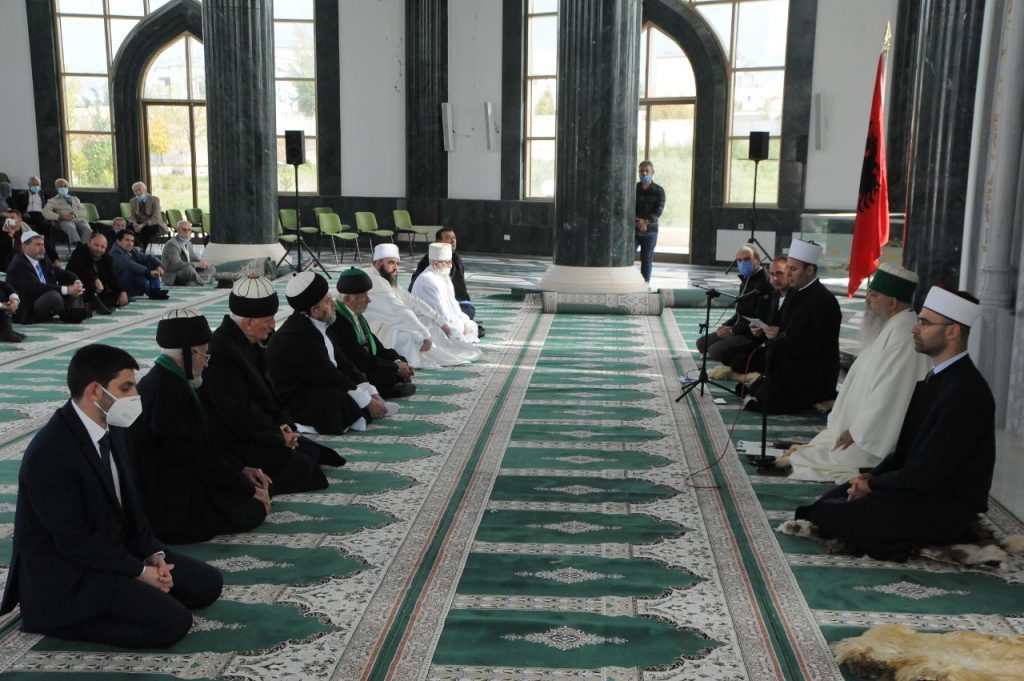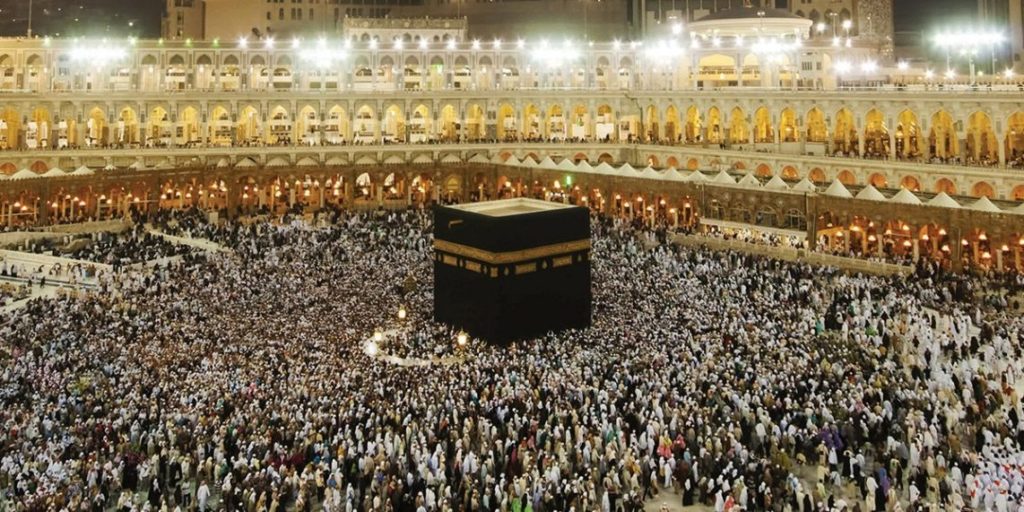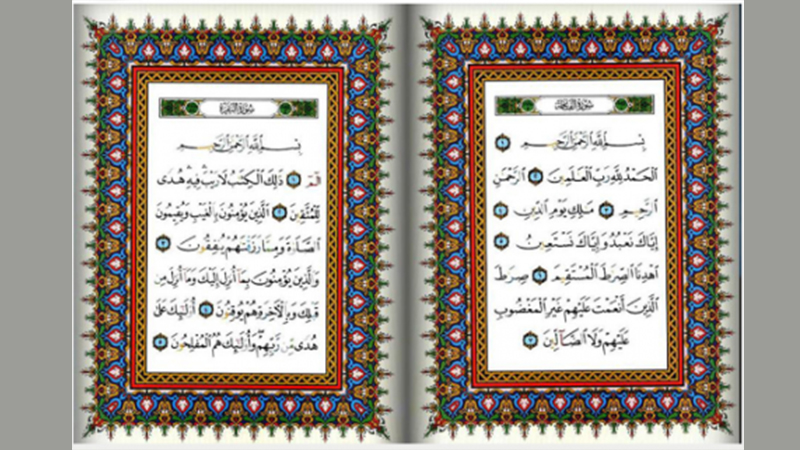
The Prophet Muhammad, was born on Monday, April 20, 571, in Mecca, Arabia. The Hashimite family to which he belonged was a branch of the noble and powerful Quraysh tribe. His father, Abdullah, was a merchant and died before he was born. Emine's mother lived until he was six years old. The orphan Muhammad, was first taken under the supervision of his grandfather Abdumuttalib for two years and, later, according to his grandfather's will, by his uncle Abu Talib.
The last prophet was the fruit of the prayer of Prophet Ibrahim, of the good news of Jesus, and of the dream of his mother, Emine. After building the Ka'bah, Prophet Ibrahim prayed to Allaah: purify (from filth and idolatry) them. (Bekare 2: 129). Jesus spoke to those around him about a Prophet who would follow him called "Ahmed." Muhammad's mother, Emine, had a dream in which she was told, "You hold the leader of the people in your womb." When he was born, she said, "I left him under the protection of the One (Allah) to protect him from the evil of every greedy." Then he named him Muhammad. "
The birth of the Prophet was a sign of acceptance of that prayer, manifestation of that glad tidings and realization of that dream.
The Prophet's father, who before the Prophet came to this world, had once set out for another city for trade purposes, where he fell ill and died. He was buried in Medina. So the Prophet, never saw his father. From the time he was born until he was four years old, he stayed with his breastfeeding mother, Halimen. After that, he stayed another two years with his mother Emine. When he was six years old, his mother took him with him to Medina to meet cousins and visit his father's grave. Since Selma, the mother of the Prophet's grandfather was from Medina, they had cousins in that city. The tomb of the Prophet Muhammad's father was in the garden of his uncle's house in Nabiga. Emine visited the grave of her husband Abdullah and the Prophet met his cousins from the Najjar tribe. On the way back, Emine got sick and died in a place called Ebva. She was buried there. Umu Ayman, brought the Prophet to Mecca and left him under the care of his grandfather. He stayed with his grandfather from the age of six until the age of eight. When the Prophet's grandfather died, according to his will, Muhammad went to live with his uncle, Abu Talib. Abu Talib was a respected man in Makkah and was known as the most respected son of Abdumuttalib.
The Prophet Muhammad experienced all these deaths when he was a child. However, this did not defeat him. He became the shepherd of his uncle's sheep in Mecca. He did all the housework with pleasure and helped with the family economy. His aunt, Fatima, treated him like her son and he never forgot that. During those years, wherever the Prophet was living, even when he was at his breastfeeding mother's house, he brought prosperity. It is a fact that although Abu Talib was not a rich man in those years, after the coming of the Prophet to dwell in him, it became clear that he was a source of blessing for his home.
When he turned 13, he started working helping his uncle in the trade. He engaged in trade for many years and became known for his honesty and virtues. When he was 20 years old, he entered an "institution" called Hilful Fudl (union of the virtuous), set up by some Meccans to fight thieves, robbers, robbers, oppression and injustice. There he was a very efficient member. When he turned 25, he married Khadija. She was 40 at the time, and her marriage proposal was primarily influenced by his reputation as "Emin" (trustworthy, honest). When he was 35 he played the role of judge at the Kaaba. There was a dispute when it came to placing the Black Stone in the right place, as each tribe claimed that they had the honor of doing this work. The Prophet placed the stone on a sheet and told each of the tribal chiefs to seize from one corner of it thus avoiding a possible conflict between the tribes.
When the Prophet came near forty, he began to isolate himself from the world and began to go out of the city for meditation and worship. He had lived a pure childhood and youth. Now, turning his head back, he felt deeply upset by the corruption and immorality in which the people around him lived. So, he began to stay for certain periods of time in a cave called Hira, near Mecca. He stayed there for a while and then returned home. Once on his way back, through the rocks and trees, he heard a voice shouting "O Muhammad!" As a result, he began to have dreams that came true the next day.
When he turned 40, in the year 610, during the month of Ramadan, the archangel Gabriel, came to him and the period of revelation began. The first revelation was the verse that begins like this: "Read in the name of your Lord Who created…". Thus, Allah, the Exalted, assigned the task of prophecy to Muhammad.
The first people to accept the Prophet's invitation to Islam were Khadija, Ali, Zayd ibn Haritha, and Abu Bakr. They were followed by Uthman, Abdurrahman ibn Auf, Sa'd ibn Abi Waqqas, Talha and Zubayr. These first Muslims, especially the Prophet, suffered great torture at the hands of idolaters. In fact, many Muslims, such as Yasir and his wife Sumeje, were killed after unbearable torture. Bilal Habeshi, Abu Fukayha, Habbab ibn Eret and Umm Abis, Nahdi and Dhinnira, also suffered greatly. These were the people who were constantly humiliated by the idolaters; even Muslim slaves and servants were subjected to many hardships.
The resistance of these early Muslims greatly influenced the spread of Islam. The truth is that during the first years of his prophecy, powerful and brave men like Hamza and Umar embraced Islam and found themselves beside the Companions and the Prophet. The more the number of those who believed in Islam increased, the more the obstacles of the idolaters aimed at preventing the support of this new religion increased. In the fifth and sixth years of the prophecy, some Muslims were given permission by the Prophet to emigrate to Abyssinia (Ethiopia), forced by the situation. In the seventh year, the disbelievers isolated the Muslims in an area of Mecca and boycotted them. They were barred from trade, travel, and relationships with other people. This situation lasted for three years. In the tenth year of the prophecy, along with the successive deaths of Khadija and Abu Talib, the suffering and torture inflicted by the enemies of Islam increased even more. Khadija and Abu Talib were respected people and this respect to some extent had guaranteed a level of protection for the Prophet. At this time, the Prophet Muhammad went to Taif in an attempt to find some support from outside. The people of Taif not only refused to accept Islam or give any support to the Prophet, but they even stoned him and he barely managed to escape by taking refuge in an orchard outside Taif bathed in blood. In his prayer after being subjected to this horrible treatment, the Prophet said that if he was fulfilling his mission properly, these tortures do not matter to him. There is no doubt that he did the right thing and that he fulfilled his responsibilities.
At this time, those ruling in Mecca made a decision according to which he should not return to the city. For this reason, he turned to Mut'im ibn Adiy in order to secure his bail, to enter Makkah. There was a tradition widely followed at that time among the prominent people of the Quraysh tribes, according to which, a person could be secured by gaining their protection. At a time when all these successive sufferings were falling like rain on his head, the Prophet Muhammad was taken by Allah on a heavenly journey (Mi’raj). This caused him to enter the audience of Allah Almighty and he was blessed in receiving divine commands without any intercessor. On this night, the Prophet sent down with him many of the rules found in surah Isra, the seventeenth surah of the Qur'an; 12 of the commandments between verse 12 and verse 39 of Surah Isra were revealed on this night. They can be listed as follows:
1- Become servants of Allah and no one else.
2- Treat your parents well.
3- Give the right that belongs to the relatives, the poor and the travelers.
4- Be neither stingy nor generous.
5- Do not kill your children for fear of poverty.
6- Do not commit immorality or lewd acts.
7- Do not kill.
8- Do not abuse the property of orphans.
9- Keep the promises.
10- Be careful of size and weight in trade.
11- Do not follow what you do not know (good or bad) and abide by it
from baseless assertions and conjectures.
12- Avoid boasting and arrogance.
The gift of such a glorious miracle through the Prophet Muhammad was a sign that sooner or later Islam would enlighten the world.
Despite all the difficulties, the Prophet Muhammad's efforts to spread the message of Islam continued. He intensified efforts at intersections where travelers coming from outside the city could cross. Finally, a group of six men who had come from Medina (Yathrib) for pilgrimage, testified to the authenticity of the message he brought and promised to fulfill the conditions of Islam. The following year, five people from this group came along with seven other people from Medina and pledged allegiance to the Prophet in Aqaba. A second covenant was made with seventy-five men the following year, who promised to protect the Prophet as they protected their wives and children. In the days that followed, by the leave of Allah and the Prophet, the Muslims who were suffering in Mecca emigrated to Medina. This emigration is known as the Hijrah in Islamic literature. The last to emigrate were the Prophet and Abu Bakr. This was a difficult emigration, with the idolaters of Mecca following them from the cave of Theur south of Mecca and continuing until they reached Medina. The Prophet and Abu Bakr had a journey with many dangers, but they finally managed to enter Medina. The people of Medina, unlike the Meccans, supported those who had abandoned their homes in Mecca for the sake of Allah. For this reason, Allah Almighty calls the Medinans Ansar (helpers) in the Qur'an. It is a fact that a brotherhood was established between the Emigrants and the Ansar immediately after the emigration of the Prophet. In this way, the act of helping people took on a spiritual dimension. This support helped overcome psychological problems. The emigrants found the opportunity to share their experience in Islam with the people of Medina. Immigrants opened shops and markets and they were able to meet their needs within a short time. In this way, the Muslims benefited from the economic life of the city.
All these events frightened the idolaters of Mecca. They wanted to destroy the Muslims before they became stronger. The result was wars between Muslims and idolaters such as Badr, Uhud, the Battle of the Trench and Muraj. In 630, Mecca was taken without bloodshed. The Prophet returned triumphant to the city from which he had been driven. His purpose after his return was to cleanse the Ka'bah of idols and to restore the Ka'bah built by Prophet Ibrahim and its environs as they should be. The Prophet did not retaliate; he held no grudge. Instead, he announced a general amnesty. He showed his greatness by forgiving when he was strong. He was planning reunion, exaltation, and had no time to lose on trivial matters. And indeed, the muezzin of the Prophet, Bilal al-Habeshi, reciting the call to prayer from the terrace of the Ka'bah, proclaimed the superiority and unity of Allah alone by making the heavens of Makkah resound.
The arrogant Havazin tribe, whose members could not absorb these new developments, devised plans to prevent the Muslims from advancing, but these plans failed. They were defeated in their war against the Muslims. As a result, Islam spread throughout the region starting from the Hijaz region and extending across the Arabian Peninsula. Within a year after the Prophet had returned to Medina, he received representatives from hundreds of tribes.
In the year 623, during the time of Hajj, the Prophet spoke in front of more than a hundred thousand Muslims. Known as the Farewell Sermon, this lecture was a summary of the ideas of Islam and introduced perfect principles in the field of human rights.
The beloved Prophet who was able to communicate the messages entrusted to him thanks to his patience, determination and ingenuity, closed his eyes to this world on Monday 8 June 632.
The period in which the Prophet lived is known as the Happy Century and the Blessed Age. During this Blessed Age, the followers of the Prophet were called companions. They mainly consisted in the vast majority of Emigrants (Muhajireen) and Ansar. This generation was made up of people who were steadfast in their faith, wise, kind, quite capable, hardworking, patient and agile, so they became an example to future generations.


